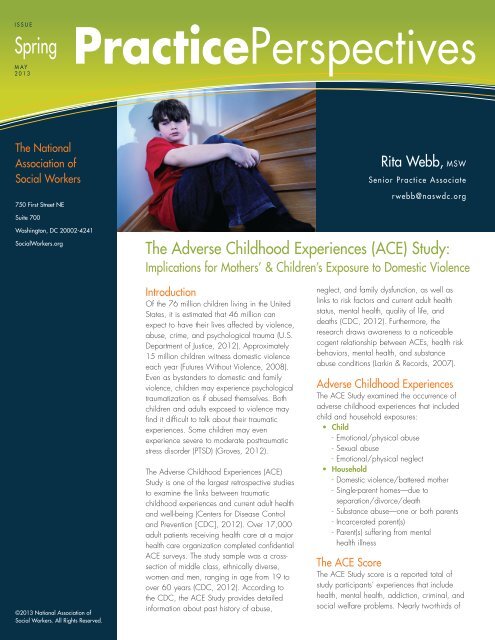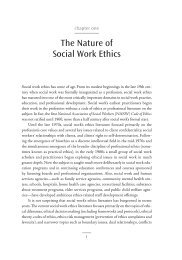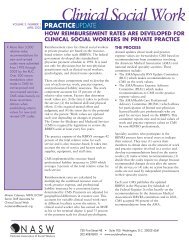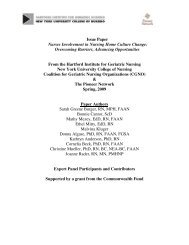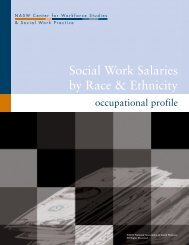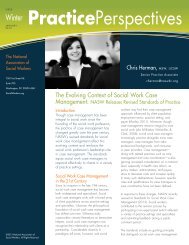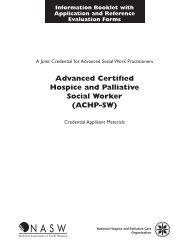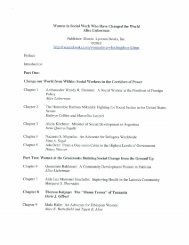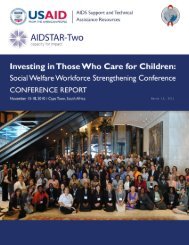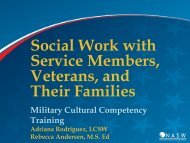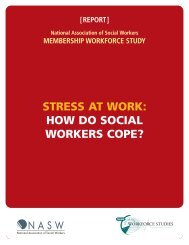(ACE) Study: Implications for Mothers - National Association of ...
(ACE) Study: Implications for Mothers - National Association of ...
(ACE) Study: Implications for Mothers - National Association of ...
- No tags were found...
Create successful ePaper yourself
Turn your PDF publications into a flip-book with our unique Google optimized e-Paper software.
I S S U ESpringM A Y2 0 1 3PracticePerspectivesThe <strong>National</strong><strong>Association</strong> <strong>of</strong>Social Workers750 First Street NERita Webb, MSWSenior Practice Associater webb@naswdc.orgSuite 700Washington, DC 20002-4241SocialWorkers.orgThe Adverse Childhood Experiences (<strong>ACE</strong>) <strong>Study</strong>:<strong>Implications</strong> <strong>for</strong> <strong>Mothers</strong>’ & Children’s Exposure to Domestic Violence©2013 <strong>National</strong> <strong>Association</strong> <strong>of</strong>Social Workers. All Rights Reserved.IntroductionOf the 76 million children living in the UnitedStates, it is estimated that 46 million canexpect to have their lives affected by violence,abuse, crime, and psychological trauma (U.S.Department <strong>of</strong> Justice, 2012). Approximately15 million children witness domestic violenceeach year (Futures Without Violence, 2008).Even as bystanders to domestic and familyviolence, children may experience psychologicaltraumatization as if abused themselves. Bothchildren and adults exposed to violence mayfind it difficult to talk about their traumaticexperiences. Some children may evenexperience severe to moderate posttraumaticstress disorder (PTSD) (Groves, 2012).The Adverse Childhood Experiences (<strong>ACE</strong>)<strong>Study</strong> is one <strong>of</strong> the largest retrospective studiesto examine the links between traumaticchildhood experiences and current adult healthand well-being (Centers <strong>for</strong> Disease Controland Prevention [CDC], 2012). Over 17,000adult patients receiving health care at a majorhealth care organization completed confidential<strong>ACE</strong> surveys. The study sample was a crosssection<strong>of</strong> middle class, ethnically diverse,women and men, ranging in age from 19 toover 60 years (CDC, 2012). According tothe CDC, the <strong>ACE</strong> <strong>Study</strong> provides detailedin<strong>for</strong>mation about past history <strong>of</strong> abuse,neglect, and family dysfunction, as well aslinks to risk factors and current adult healthstatus, mental health, quality <strong>of</strong> life, anddeaths (CDC, 2012). Furthermore, theresearch draws awareness to a noticeablecogent relationship between <strong>ACE</strong>s, health riskbehaviors, mental health, and substanceabuse conditions (Larkin & Records, 2007).Adverse Childhood ExperiencesThe <strong>ACE</strong> <strong>Study</strong> examined the occurrence <strong>of</strong>adverse childhood experiences that includedchild and household exposures:• Child- Emotional/physical abuse- Sexual abuse- Emotional/physical neglect• Household- Domestic violence/battered mother- Single-parent homes—due toseparation/divorce/death- Substance abuse—one or both parents- Incarcerated parent(s)- Parent(s) suffering from mentalhealth illnessThe <strong>ACE</strong> ScoreThe <strong>ACE</strong> <strong>Study</strong> score is a reported total <strong>of</strong>study participants’ experiences that includehealth, mental health, addiction, criminal, andsocial welfare problems. Nearly two-thirds <strong>of</strong>
The <strong>ACE</strong> researchdemonstrates thatexposure todomestic violencecan increase risk<strong>for</strong> physical,mental health,and substanceabuse conditions.the <strong>ACE</strong> <strong>Study</strong> respondents reported a minimum <strong>of</strong>one <strong>ACE</strong> related to personal and family stressors,such as witnessing their mother being battered;parent(s) with substance abuse, mental illness,criminal behavior; or being incarcerated (Felitti, etal., 1998). These childhood experiences occurbe<strong>for</strong>e the age <strong>of</strong> 18 years, when adverseexperiences can disrupt early psychosocial andneurodevelopmental stages (Larkin, 2013). The<strong>ACE</strong> <strong>Study</strong> score demonstrates experiences <strong>of</strong>childhood abuse, neglect and exposure to othertraumatic violence and family stressors aspredictive <strong>of</strong> adolescent and adult long-termhealth, behavioral, and social problems.The higher the <strong>ACE</strong> score, the greater prevalence<strong>of</strong> co-occurring physical, mental health, andsubstance abuse conditions such as depression,illicit drug use, alcohol abuse, smoking, suicideattempts, intimate partner abuse (domesticviolence), sexually transmitted disease, unintendedpregnancy, high-risk sexual activity, fetal death,liver disease, heart disease, obesity, and chronicobstructive pulmonary disease (CDC, 2012). The<strong>ACE</strong> score revealed that <strong>ACE</strong>s are common, <strong>of</strong>tenoccur in groups, and contribute to high lifetimecosts and economic toll.<strong>ACE</strong> Findings <strong>of</strong> ChildhoodExposure to Domestic Violenceand Behavioral ConditionsThe <strong>ACE</strong> <strong>Study</strong> found that many respondentsreported at least one adverse experience duringchildhood. However, those adult participantswho reported four or more <strong>ACE</strong>s were atsignificantly increased risk <strong>for</strong> suicide attempts,depression, drug abuse, and alcoholism (FuturesWithout Violence, 2008). For those participantswho reported witnessing their mother’s abuse,there was a substantial increase and graded riskduring adolescence <strong>for</strong> alcohol use, drug use,and depression (Dube et al., 2006).The <strong>ACE</strong> research demonstrates that exposure todomestic violence can increase risk <strong>for</strong> physical,mental health, and substance abuse conditions.Furthermore, research on children who witnessdomestic violence found that they face anincreased risk <strong>for</strong> mental health issues related tojuvenile delinquency, antisocial behavior, andescalated rates <strong>of</strong> depression, anxiety, and PTSD(Alpert, 2010). The impact <strong>of</strong> chronic domesticviolence exposure in childhood was found tohave long-term effects throughout the life span.<strong>Implications</strong> <strong>of</strong> <strong>ACE</strong>s <strong>for</strong> Resiliencyin ChildhoodThe study findings provide insight into identifyingfactors <strong>for</strong> consideration and understanding <strong>of</strong>the effects <strong>of</strong> <strong>ACE</strong>s related to domestic violenceand family dysfunction over the life span. Manylessons continue to be learned from the <strong>ACE</strong>study related to prevention and intervention in theareas <strong>of</strong> health, mental health, addictions,criminal justice, and social welfare.In early childhood development, a mother’sinfluence on resilience in children and exposureto traumatic, stressful, and violent situations hasbeen examined. In particular, research suggeststhat mothers’ exposure to domestic violence anddepression can influence early childhood coping,adaptation, and resilience. Still, the effects <strong>of</strong>domestic violence on children vary widely (Groves,2012). Despite witnessing domestic violence,many children have adequate behavioral andemotional functioning (U.S. Department <strong>of</strong> Healthand Human Services, 2009). Generally, protectivefactors and less maternal exposure to domesticviolence are thought to promote better adaptationcharacteristics in children. Factors that are likelyto have affective influences <strong>for</strong> resilient childreninclude the following: positive parental/partnerrelationships, effective parenting when under stress,and family/support networks. Subsequently, whenmothers are able to model effective coping andconvey a sense <strong>of</strong> security and confidence to theirchildren, there is an increase likelihood <strong>of</strong> betterfunctioning and managing <strong>of</strong> stress by the child.(Groves, 2012)<strong>ACE</strong> <strong>Study</strong> <strong>Implications</strong> <strong>for</strong>Social WorkersThe <strong>ACE</strong> <strong>Study</strong> affirms the interrelationship <strong>of</strong>adverse childhood experience <strong>of</strong> abuse, neglect,and family dysfunction on adult health andwell-being. Social workers can use the studyfindings to explore how childhood traumaticexposure to violence and other <strong>ACE</strong>s are linkedto medical, mental health, and substance abuseconditions throughout the life span. The data,factors, and findings gathered from the <strong>ACE</strong> studycan guide social workers and support them inaddressing policies and practices that promoteearly childhood prevention and treatmentintervention. The study findings draw attention toimproving adult physical, mental health, andsubstance abuse conditions by focusing onprimary prevention <strong>of</strong> childhood physical and
Center <strong>for</strong> Work<strong>for</strong>ce Studies & Social Work Practice Recent PublicationsChildren & Families• Social Work Services with Parents: How Attitudes andApproaches Shape the RelationshipClinical Social Work• 2012 Medicare Updates <strong>for</strong> Clinical Social Workers• Clinical Social Workers and 5010: Frequently Asked Questions• Clinical Social Workers Be Aware: Version 5010 is Coming• Documenting For Medicare: Tips For Clinical Social Workers• Retiring? Tips For Closing Your Private Practice• Risk Management In Clinical PracticeEducation• Addressing the Educational Needs <strong>of</strong> Older Youth• Gangs: A Growing Problem in SchoolsLeadership and Organizations• Beyond Survival: Ensuring Organizational Sustainability• NASW Leadership in Palliative & Hospice Social Work• Organizational Integration <strong>of</strong> Cultural Competency:Building Organizational Capacity to Improve ServiceDelivery to Culturally Diverse Populations• Organizing For Office SafetyPoverty• The Af<strong>for</strong>dable Care Act: <strong>Implications</strong> <strong>for</strong> Low andModerate-Income Women’s Health and Well-Being• Overcoming Economic HardshipsWork<strong>for</strong>ce & Career Development• Accountable Care Organizations (ACOs): Opportunities<strong>for</strong> the Social Work Pr<strong>of</strong>ession• Career Coaching: A Valuable Resource For Social Workers• Furthering Your Social Work Education: Obtaining A Doctorate• Negotiating A Higher Salary• Networking: Finding Opportunities <strong>for</strong> Career Development• Securing The Social Work Job You Seek: Advice For TheInterview Process• Setting and Maintaining Pr<strong>of</strong>essional Boundaries• State Health Insurance Exchanges: What Social WorkersNeed to Know• The Value Of Social Work Mentoring• Transitioning Across State Lines: Licensing Tips Beyond9 To 5: Working As A ConsultantPractice Perspectives Spring May 2013750 First Street NE, Suite 700Washington, DC 20002-4241SocialWorkers.org


